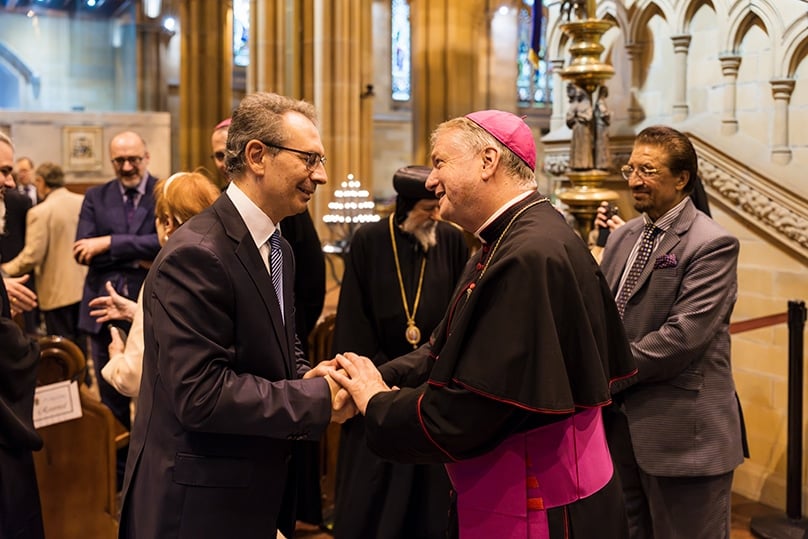
This is the edited text of the reflection given by Archbishop Anthony Fisher OP at an Occasion of Common Lamentation and Prayer for Peace, St Mary’s Cathedral Sydney, 6 December 2023
His name amongst Jews is Yirmeyahu (ירמיה), amongst Muslims Irmiyā, and for Christians Jeremiah “the weeping prophet” (c. 650-570 BC). To him are attributed the Books of Jeremiah, of Kings and of Lamentations. The last of these, from which we have just read (Lam 3:17-26), is a series of poetic laments, written in the aftermath of the fall of Jerusalem in 586 BC. The forces of Nebuchadnezzar II of Babylon laid violent siege to Jerusalem for thirty months, razed the Temple and public buildings, dissolved the Kingdom of Judah, and took the survivors into exile in Babylon.
Jeremiah’s laments articulate the depths of human anguish. His words are heartfelt reflections on humiliation and defeat, suffering and death, alienation and grief. “Behold, O Lord, for I am despised …Is any sorrow like my sorrow?… My eyes are spent with weeping; my soul is in tumult; my heart poured out in grief” (Lam 1:11-12; 2:11). Though a man of God, both priest and prophet, this didn’t insulate him from witnessing the worst of human behaviour. He wonders out loud how God could allow this. “The Lord has become like an enemy to Israel, destroyed all its palaces, laid ruin to its strongholds, and multiplied its mourning and lamentation” (Lam 2:2,5). And so, the holy man anguishes: “The law is no more; the prophets without vision… babes faint… and children die of hunger in the streets… the young and the old lie in the dust… enveloped by bitterness and tribulation, the Lord has made me to dwell in darkness, like the dead long forgotten… and though I cry for help, he shuts out my prayer… Have you utterly rejected us, O Lord?” (Lam 2:9-21; 3:5-15; 5:22)
Visceral hatred, unspeakable brutality and unbridled violence throw into question our very being and that of God Himself. For some, it strikes a terminal blow to their faith in both. Divine order and justice, God’s omnipotence and benevolence, all are brought into question by the horrors of terrorism and warfare. How can God allow the innocents to suffer? How can human beings do so?
We lament the loss, then, not just of loved ones and neighbours, of health and security, of order and future, but also of our own innocence, our faith in God and humanity, our trust in providence. War kills our ability to relate to the other as a brother or sister, our sense of a common humanity with common hopes and needs, our solidarity with the universe. Atrocity breeds righteous anger, righteous anger unrighteous, unrighteous anger reprisal. God fails to deliver justice and security we want, so we deliver vengeance. An endless cycle of retaliation. A hardening of hearts. A refusal to forgive. “Now I am become Death, the destroyer of worlds,” as we heard J. Robert Oppenheimer say in this year’s film, echoing the Hindu scriptures.
Are we doomed to become Death? Jeremiah thought not. Amidst his grief and anger, the prophet said “I call this to mind, and therefore I have hope: that the steadfast love of the Lord never ceases, that his mercies never come to an end… The Lord is good to those who wait on him, to the soul that seeks him… He will not cast us off forever, and though he allows us grief, he will show us compassion… for he does not willingly afflict or grieve the sons of men.” (Lam 3:21-33) Whilst Jeremiah held nothing back in expressing his grief, he knew deep down that God cannot be behind these terrible things. No, God does not will our affliction and grief. He is not some uninterested deity who gets the universe going and then abandons it. However dark we might feel, the children of Abraham know that God is our cosmic lover, our intimate, our saviour.
Jeremiah knew this. “I called upon your name, O Lord, from the depths of the pit; and you heard the cry of my appeal… You came near when I called and said, ‘Have no fear!’” (Lam 3:55-57) Such confidence in redemption comes not from wishful thinking but experience of God. And so, the prophet could say assuredly that God is always with us, that each night He carries us through the darkness and each morning enables our renewal. Our hope is not ultimately in human peace processes, important as these are; it is hope in the God who can change hearts, put forgiveness where there is vengeance, peace in place of turmoil, love instead of hate.
In the Christian calendar today is the Feast of St Nicholas of Myra who died on this day in the year 343 AD. He was a bishop, philanthropist and miracle-worker, a council father at Nicaea I and co-author of the Christian creed. Imprisoned and tortured under Diocletian, he was released under Constantine. His legendary habit of secret gift-giving, including leaving dowries for poor girls to save them from prostitution and slavery, sadly evolved into the commercialism and sentimentality of Santa Claus. But St Nicholas is, above all, a pointer to the birth of at Christmas of that Prince of Peace for whom the weeping prophet Jeremiah longed and for whom our war-torn world still longs. What better Christmas present might we ask of God and Santa than peace?—peace in our hearts, peace in our relationships, peace in the land of Christ’s birth, peace in our world?
